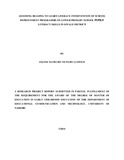| dc.description.abstract | The purpose of this study was to assess reading to learn literacy intervention on lower primary pupils‟ literacy skills in Kwale District. The specific study objectives included; assessing the extent of application of „reading to learn literacy intervention‟ in daily learning and teaching of lower primary schools with Rtl programme in Kwale District. To establish how reading to learn literacy intervention has contributed to literate environment of lower primary schools in Kwale District and to evaluate the influence of „reading to learn literacy intervention‟ on performance in literacy skills among lower primary pupils in Kwale District. The study adopted a cross-sectional survey research design targeting all the schools, teachers, head teachers, pupils and School Improvement Programme (SIP) officer implementing „Reading to Learn (RtL) programme in Kwale District. Data was collected using questionnaires, interviews, tests and observations. Collected data was cleaned, coded and analyzed using descriptive statistics such as mean, frequencies and percentages and Analysis of Variance (ANOVA) to describe and summarize data. The study found that; Most lower primary school teachers implement reading to learn programme in their daily instructional practices, In addition, the majority teachers are motivated to implement the programme. The study also found that there was adequate instructional supervision of Rtl programme by the headteachers and SIP officer. It was also evident that lower primary schools were rich in terms of their literate environment. The findings are likely to assist identify contingencies to be tackled in literacy learning. This study is likely to benefit NGOs in their literacy interventions to identify challenges and come up with ways to improve the programs. It will also help Quality Assurance and Standards Directorate in the Ministry of Education Science and Technology to use results of present study to advise on reading instructional materials and resources, in-service teacher training on effective reading instructional strategies appropriate for lower- primary schools. KICD may use findings to improve the curriculum to prepare teachers and improve teaching / learning resources including text books. | en_US |

